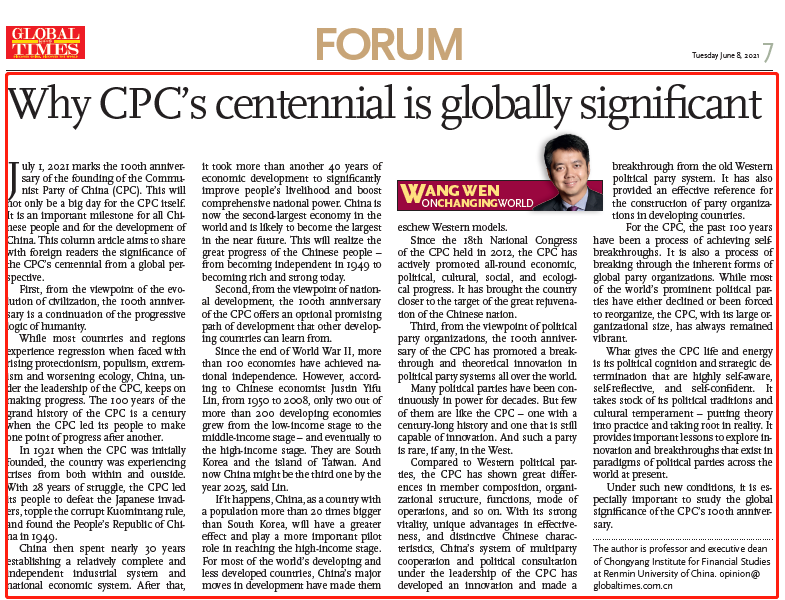Commentaries
Your Present Location: Teacher_Home> Wang Wen> CommentariesWang Wen: Why CPC's centennial is globally significant
By: Wang Wen Source: Global Times Published: 2021-06-08
July 1, 2021 marks the 100th anniversary of the founding of the Communist Party of China (CPC). This will not only be a big day for the CPC itself. It is an important milestone for all Chinese people and for the development of China. This column article aims to share with foreign readers the significance of the CPC's centennial from a global perspective.

First, from the viewpoint of the evolution of civilization, the 100th anniversary is a continuation of the progressive logic of humanity.
While most countries and regions experience regression when faced with rising protectionism, populism, extremism and worsening ecology, China, under the leadership of the CPC, keeps on making progress. The 100 years of the grand history of the CPC is a century when the CPC led its people to make one point of progress after another.
In 1921 when the CPC was initially founded, the country was experiencing crises from both within and outside. With 28 years of struggle, the CPC led its people to defeat the Japanese invaders, topple the corrupt Kuomintang rule, and found the People's Republic of China in 1949.
China then spent nearly 30 years establishing a relatively complete and independent industrial system and national economic system. After that, it took more than another 40 years of economic development to significantly improve people's livelihood and boost comprehensive national power. China is now the second-largest economy in the world and is likely to become the largest in the near future. This will realize the great progress of the Chinese people - from becoming independent in 1949 to becoming rich and strong today.
Second, from the viewpoint of national development, the 100th anniversary of the CPC offers an optional promising path of development that other developing countries can learn from.
Since the end of World War II, more than 100 economies have achieved national independence. However, according to Chinese economist Justin Yifu Lin, from 1950 to 2008, only two out of more than 200 developing economies grew from the low-income stage to the middle-income stage - and eventually to the high-income stage. They are South Korea and the island of Taiwan. And now China might be the third one by the year 2025, said Lin.
If it happens, China, as a country with a population more than 20 times bigger than South Korea, will have a greater effect and play a more important pilot role in reaching the high-income stage. For most of the world's developing and less developed countries, China's major moves in development have made them eschew Western models.
Since the 18th National Congress of the CPC held in 2012, the CPC has actively promoted all-round economic, political, cultural, social, and ecological progress. It has brought the country closer to the target of the great rejuvenation of the Chinese nation.
Third, from the viewpoint of political party organizations, the 100th anniversary of the CPC has promoted a breakthrough and theoretical innovation in political party systems all over the world.
Many political parties have been continuously in power for decades. But few of them are like the CPC - one with a century-long history and one that is still capable of innovation. And such a party is rare, if any, in the West.
Compared to Western political parties, the CPC has shown great differences in member composition, organizational structure, functions, mode of operations, and so on. With its strong vitality, unique advantages in effectiveness, and distinctive Chinese characteristics, China's system of multiparty cooperation and political consultation under the leadership of the CPC has developed an innovation and made a breakthrough from the old Western political party system. It has also provided an effective reference for the construction of party organizations in developing countries.
For the CPC, the past 100 years have been a process of achieving self-breakthroughs. It is also a process of breaking through the inherent forms of global party organizations. While most of the world's prominent political parties have either declined or been forced to reorganize, the CPC, with its large organizational size, has always remained vibrant.
What gives the CPC life and energy is its political cognition and strategic determination that are highly self-aware, self-reflective, and self-confident. It takes stock of its political traditions and cultural temperament - putting theory into practice and taking root in reality. It provides important lessons to explore innovation and breakthroughs that exist in paradigms of political parties across the world at present. Under such new conditions, it is especially important to study the global significance of the CPC's 100th anniversary.
The author is professor and executive dean of Chongyang Institute for Financial Studies at Renmin University of China.
Please Find us: Twitter: RDCYINST YouTube: RealRDCY LinkedIn: 人大重阳RDCY Facebook: RDCYINST Instagram: rdcyinst
Key Words: China; CPC; 100th anniversary; Global Times























































































 京公网安备 11010802037854号
京公网安备 11010802037854号





